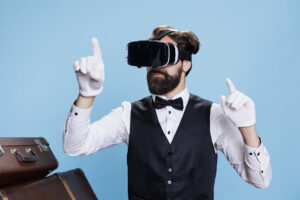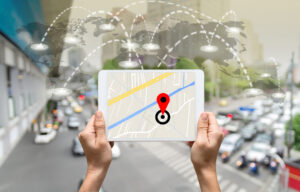Digital Marketing for Hotels 2023 – UX, VR, AI, and Other Acronyms
Digital Marketing 2023
The digital marketing landscape changes constantly and the perpetual motion of digital media can make it hard to find your footing.
We try to keep you aware of the latest trends and recommend how hotels should evolve along with them. A positive and engaging user experience (UX) utilizes many technologies from Virtual Reality (VR) to simulate realistic experiences, to Artificial Intelligence (AI) that can create data models to help customize and personalize your target market content.
From the dominating march of mobile to voice-activated interfaces and high-impact interactive graphics, we’ll highlight some important considerations for your digital marketing strategy in 2023.
Improved User Experience
User Experience, or UX, is how the user interacts with your service or perceives your brand through your website or app. Good UX design means ease of use, utility, and efficiency and needs to translate across all devices. This applies especially to mobile since data shows more than half of users worldwide use their phones to access the web.
Good UX design is a combination of informative and engaging. Use simple and intuitive navigation, and don’t overwhelm the user with too much information on your main landing pages, or with too much advertising or distracting graphics.
Current UX design trends include:
- Minimalism, websites or apps free of intrusive advertising and popups
- Voice-activated interfaces, hands-free controls
- Block web design or modular design
- ‘Scrollytelling’ – telling a story as the user scrolls
- Utilizing video and audio to make the storytelling more immersive
- Interactive graphics and maps

Virtual Reality
Virtual Reality, or VR, allows brands to promote their offerings through realistic, simulated experiences–a tour of rooms, your lobby, pool, spa or restaurant, or nearby attractions.
VR is particularly important in the hospitality industry because of the growing amount of information customers need before they will book a room. VR can digitally ‘transport’ your potential customer to your destination and offer a ‘try before you buy’ experience, especially when utilizing current 360-degree video technology.

While few VR marketing projects are so completely immersive as to require a VR headset, expect more innovative VR marketing tactics in the coming year.
Artificial Intelligence
The impact of Artificial Intelligence, or AI, in almost every industry, will be head-spinning. With all the growth opportunities comes the downside fear of job displacement. But smart businesses must explore the potential or be left behind.
Hoteliers who understand how to leverage AI tools to become more efficient and effective will become more valuable than ever.*
For the hospitality industry, AI can enhance hotel revenue management with predictive modeling. Marketers can leverage AI data models, algorithms, and historical data to predict future demand and revenue, optimize pricing, customize and target content, and ultimately maximize revenue.
AI can help hotels better understand their target audience to customize and target content and personalize the customer experience. And AI will help identify effective influencers for hotel campaigns and assist hotels in monitoring social media activity, customer feedback, and brand perception.
Some AI technology benefits:
- More targeted advertising and PR
- Accurate trendspotting and predictions
- A deeper understanding of buyer behavior
- Increased customer retention and brand loyalty
- Enhanced self-service and automated capabilities
- Higher ROI through effective targeting
Interactive Content
All of these digital practices and technologies work towards the goal of more interactive content. They create experiences, engagement, and two-way conversations with your customers. Passive posts are passe’. Strive for dynamic interactions wherever possible.

Interactive content improves and streamlines the customer experience, produces more leads and conversions, and enhances brand loyalty. Increased engagement and longer site sessions also improve SEO.
There are many low-cost high-impact interactive content options to explore:
- Interactive infographics
- Interactive maps
- Interactive videos
- Contests
- Calculators
- Quizzes
- Branded apps
Make sure to optimize all of these for mobile.
References:
https://www.revfine.com/virtual-reality-hospitality-industry/

